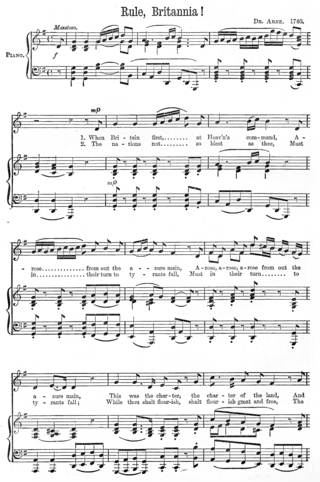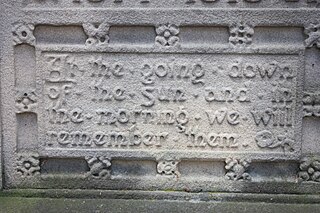
"And did those feet in ancient time" is a poem by William Blake from the preface to his epic Milton: A Poem in Two Books, one of a collection of writings known as the Prophetic Books. The date of 1804 on the title page is probably when the plates were begun, but the poem was printed c. 1808. Today it is best known as the hymn "Jerusalem", with music written by Sir Hubert Parry in 1916. The famous orchestration was written by Sir Edward Elgar. It is not to be confused with another poem, much longer and larger in scope and also by Blake, called Jerusalem The Emanation of the Giant Albion.

"Rule, Britannia!" is a British patriotic song, originating from the 1740 poem "Rule, Britannia" by James Thomson and set to music by Thomas Arne in the same year. It is most strongly associated with the Royal Navy, but is also used by the British Army.
Sea Pictures, Op. 37 is a song cycle by Sir Edward Elgar consisting of five songs written by various poets. It was set for contralto and orchestra, though a distinct version for piano was often performed by Elgar. Many mezzo-sopranos have sung the piece.

A Sea Symphony is an hour-long work for soprano, baritone, chorus and large orchestra written by Ralph Vaughan Williams between 1903 and 1909. The first and longest of his nine symphonies, it was first performed at the Leeds Festival in 1910 with the composer conducting, and its maturity belies the relatively young age — thirty — when he began sketching it. Moreover it is one of the first symphonies in which a chorus is used throughout as an integral part of the texture and it helped set the stage for a new era of symphonic and choral music in Britain during the first half of the 20th century. It was never numbered.
"The Water Is Wide" is a folk song of Scottish origin. It remains popular in the 21st century. Cecil Sharp published the song in Folk Songs From Somerset (1906).
"A Life on the Ocean Wave" is a poem-turned-song by Epes Sargent published in 1838 and set to music by Henry Russell. It is the iconic Regimental March of His Majesty's Royal Marines.
"Sussex by the Sea" is a song written in 1907 by William Ward-Higgs, often considered to be the unofficial county anthem of Sussex. It became well known throughout Sussex and is regularly sung at celebrations throughout the county. It can be heard during many sporting events in the county, during the Sussex bonfire celebrations and it is played by marching bands and Morris dancers across Sussex. It is the adopted song of Brighton & Hove Albion Football Club, Sussex Division Royal Naval Reserve, Sussex Association of Naval Officers and Sussex County Cricket Club.

Beshalach, Beshallach, or Beshalah is the sixteenth weekly Torah portion in the annual Jewish cycle of Torah reading and the fourth in the Book of Exodus. It constitutes Exodus 13:17–17:16. In this parashah, Pharaoh changed his mind and chased after the Israelites, trapping them at the Sea of Reeds. God commanded Moses to split the sea, allowing the Israelites to escape, then closed the sea back upon the Egyptian army. The Israelites also experience the miracles of manna and clean water. And the Amalekites attacked, but the Israelites were victorious.

Adon Olam is a hymn in the Jewish liturgy. It has been a regular part of the daily and Shabbat (Sabbath) liturgy since the 15th century.
"The Swimmer" is a poem by the Australian poet Adam Lindsay Gordon. The poem is from his last volume of poems Bush Ballads and Galloping Rhymes published in 1870, when he was living at Melbourne. In The Poems of Adam Lindsay Gordon, it is grouped among "Poems Swinburnian in Form and Pessimism, but full of the Personality of Gordon."

"Where Corals Lie" is a poem by Richard Garnett which was set to music by Sir Edward Elgar as the fourth song in his song-cycle Sea Pictures. The poem was first published in Io in Egypt and other poems in 1859 and subsequently anthologized in Sea Music in 1888.

"For the Fallen" is a poem written by Laurence Binyon. It was first published in The Times in September 1914.

"Dear Lord and Father of Mankind" is a hymn with words taken from a longer poem, "The Brewing of Soma" by American Quaker poet John Greenleaf Whittier. The adaptation was made by Garrett Horder in his 1884 Congregational Hymns.

Psalm 92 is the 92nd psalm of the Book of Psalms, beginning in English in the King James Version: "It is a good thing to give thanks unto the LORD". In the slightly different numbering system used in the Greek Septuagint and Latin Vulgate translations of the Bible, this psalm is Psalm 91. In Latin, it is known as "Bonum est confiteri Domino ". The psalm is known as Mizmor Shir L'yom HaShabbat, is ostensibly dedicated to the Shabbat day.
"A Child Asleep" is a song, with lyrics from a poem written by Elizabeth Barrett Browning. It was set to music by the English composer Edward Elgar in December 1909 and published in 1910 by Novello. It was first published by Browning in 1840.

The Starlight Express is a children's play by Violet Pearn, based on the imaginative novel A Prisoner in Fairyland by Algernon Blackwood, with songs and incidental music written by the English composer Sir Edward Elgar in 1915.
Coronation Ode, Op. 44 is a work composed by Edward Elgar for soprano, alto, tenor and bass soloists, chorus and orchestra, with words by A. C. Benson.

Johann Sebastian Bach composed the church cantata O Ewigkeit, du Donnerwort, BWV 20, in Leipzig for the first Sunday after Trinity and first performed it on 11 June 1724. Bach composed it when beginning his second year as Thomaskantor in Leipzig. It is the first cantata he composed for his second annual cycle which was planned to contain chorale cantatas, each based on a Lutheran hymn. The cantata is focused on Johann Rist's 1642 hymn "O Ewigkeit, du Donnerwort", with a chorale melody by Johann Schop. As usual for Bach's chorale cantatas to come in the cycle, selected hymn stanzas were retained while the others were paraphrased by a contemporary poet who transformed their ideas into a sequence of alternating recitatives and arias. For this cantata, the first stanza was used unchanged, and two more stanzas to conclude the cantata's two parts. The first part was performed before the sermon, the second part after the sermon. The first part is in seven movements, and the second part is in four movements.
"The Ballad of Cassandra Southwick" is a poem written by American Quaker poet John Greenleaf Whittier in 1843. It details the religious persecution of Cassandra Southwick's youngest daughter Provided Southwick, a Quaker woman who lived in Salem, Massachusetts and is the only white female known to be put up at auction as a slave in the United States.

A Song for the Lord Mayor's Table is a cycle of six songs with music by William Walton, first performed in 1962. The words, chosen by the librettist Christopher Hassall, are by six different British poets, two of them anonymous. Originally for soprano and piano, the cycle was later orchestrated. The work was premiered at Goldsmiths' Hall, London on 18 July 1962 by Elisabeth Schwarzkopf and Gerald Moore, during the City of London Festival. The orchestral version was first performed at the Mansion House, London on 7 July 1970, by Janet Baker with the English Chamber Orchestra conducted by George Malcolm.












